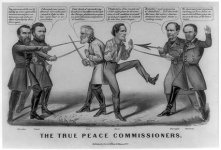jazzeum
Four Star General
- Joined
- Apr 23, 2005
- Messages
- 38,889
No, not Lincoln and Grant but Davis and Lee.
The partnership lasted from March 1862 until the end of the war and according to an article in the Disunion series, their relationship was arguably one of history’s great pairings of civilian and military leadership. It took Abraham Lincoln almost two years longer to form a similar relationship with Ulysses S. Grant, who became general in chief of the Union Army in March 1864.
As many know, Lee was not Jefferson Davis' top generals when the war began; P.G.T. Beauregard and Joseph Johnston were. Although the Battle of Bull Run was a success for the Confederacy, Davis and his generals were not on the "same page": Beauregard's battle report was leaked to the newspapers and Johnston was unhappy over certain matters, (becoming excessively secretive, which left Davis feeling uninformed).
In March 1862 Lee became a military adviser and as he was already well-respected across the South, his stock rose and continued to rise and he kept Lee up to date.
What was the source of their friendship? Lee's early success, not to mention that Davis, who had gone to West Point and had once imagined becoming a Confederate general himself, saw something of his martial ideal in Lee. However, Lee was loyal to Davis and respected the notion of civilian control of the Army.

A cartoon showing Robert E. Lee and Jefferson Davis surrounded by Union generals.
Their partnership did somewhat suffer during the period preceding Vicksburg/Gettysburg as Davis was concerned about his home state but Lee advocated an invasion of the North to forestall the inevitable. Davis sided with Lee.
But in the 45 days preceding Gettysburg, the pair wasn’t as fully synchronized as usual, partly owing to Davis’s Vicksburg distractions. Their often-perfect mutual understanding fell apart. When Lee requested reinforcements from departments below Virginia, Davis compromised with lesser substitutes. Lee’s plan to threaten Washington from the south as well, which he had pushed on Davis, went unexecuted. In part as a result, the Union was able to bring a large force to bear at Gettysburg, and Lee was defeated in the war’s pivotal confrontation.
The partnership eventually ended in 1865. Lee never faced imprisonment but Davis stayed in jail for two years until his release. Asked by the prosecutor at Davis' trial (in order to demonstrate Davis' culpability for all Confederate activities), Lee responded "I am responsible for what I did." They never see each other again.
The full article can be accessed here.
The partnership lasted from March 1862 until the end of the war and according to an article in the Disunion series, their relationship was arguably one of history’s great pairings of civilian and military leadership. It took Abraham Lincoln almost two years longer to form a similar relationship with Ulysses S. Grant, who became general in chief of the Union Army in March 1864.
As many know, Lee was not Jefferson Davis' top generals when the war began; P.G.T. Beauregard and Joseph Johnston were. Although the Battle of Bull Run was a success for the Confederacy, Davis and his generals were not on the "same page": Beauregard's battle report was leaked to the newspapers and Johnston was unhappy over certain matters, (becoming excessively secretive, which left Davis feeling uninformed).
In March 1862 Lee became a military adviser and as he was already well-respected across the South, his stock rose and continued to rise and he kept Lee up to date.
What was the source of their friendship? Lee's early success, not to mention that Davis, who had gone to West Point and had once imagined becoming a Confederate general himself, saw something of his martial ideal in Lee. However, Lee was loyal to Davis and respected the notion of civilian control of the Army.

A cartoon showing Robert E. Lee and Jefferson Davis surrounded by Union generals.
Their partnership did somewhat suffer during the period preceding Vicksburg/Gettysburg as Davis was concerned about his home state but Lee advocated an invasion of the North to forestall the inevitable. Davis sided with Lee.
But in the 45 days preceding Gettysburg, the pair wasn’t as fully synchronized as usual, partly owing to Davis’s Vicksburg distractions. Their often-perfect mutual understanding fell apart. When Lee requested reinforcements from departments below Virginia, Davis compromised with lesser substitutes. Lee’s plan to threaten Washington from the south as well, which he had pushed on Davis, went unexecuted. In part as a result, the Union was able to bring a large force to bear at Gettysburg, and Lee was defeated in the war’s pivotal confrontation.
The partnership eventually ended in 1865. Lee never faced imprisonment but Davis stayed in jail for two years until his release. Asked by the prosecutor at Davis' trial (in order to demonstrate Davis' culpability for all Confederate activities), Lee responded "I am responsible for what I did." They never see each other again.
The full article can be accessed here.

